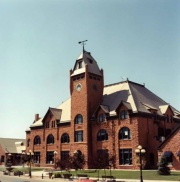Brownstone
Jump to navigation
Jump to search
Description
A brownish-red shade of Sandstone used for building construction. Brownstone is typically composed of Quartz and Feldspar grains cemented with a highly ferruginous red Clay. The interstitial iron oxides provide color that ranges from pinkish brown to a dark chocolate. Brownstones were widely used for home facades in the Mid-Atlantic to New England regions in the late 19th century. Some examples of brownstone are: Portland stone, Connecticut brownstone, Hummelstown brownstone, New Jersey brownstone, Lake Superior brownstone, and Longmeadow stone.
Synonyms and Related Terms
Portland stone, Connecticut brownstone, Hummelstown brownstone, New Jersey brownstone, Lake Superior brownstone, and Longmeadow stone.
Sources Checked for Data in Record
- Ralph Mayer, A Dictionary of Art Terms and Techniques, Harper and Row Publishers, New York, 1969 (also 1945 printing)
- Dictionary of Building Preservation, Ward Bucher, ed., John Wiley & Sons, Inc., New York City, 1996
- Anne Grimmer, Glossary of Building Stone Terms, A Glossary of Historic Masonry Deterioration Problems and Preservation Treatments, National Park Service, Washington DC, 1984
- Frank A. Lent, Trade names and Descriptions of Marbles, Limestones, Sandstones, Granites and Other Building Stones Quarried in the United States Canada and other Countries., Stone Publishing Co, New York, 1925
- Wikipedia, the free encyclopedia, at http://www.wikipedia.com Comment: http://en.wikipedia.org/wiki/Brownstone (Accessed Feb. 2, 2006)
